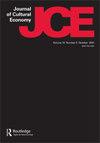Compounding financial frontiers: capital seeds and seeds for capital
IF 1.9
3区 社会学
Q1 CULTURAL STUDIES
引用次数: 1
Abstract
ABSTRACT More than fifty years of civil war has left about eight million internally displaced people in Colombia, with millions struggling to make a living in new precarious urban spaces. Illicit narcoparamilitary groups, also emergent from the conflict, have dispossessed millions from their land and become vital moneylenders that enable displaced people to work and subsist in cities while profiting from them. Using the metaphor of compounding, I suggest thinking of financial frontiers as consecutive processes of expansive economic growth where one asset or principal (land dispossession and rural displacement in the Colombian case) originates exponential profits over time, benefiting narcoparamilitary groups. Such exponential gain happens gradually in circular financial transactions. Each transaction produces extra profits and opens possibilities for new financial transactions that further extract value from displacement and land dispossession. This approach helps us understand the social relations that permit capital accumulation over long periods, across geographic spaces, through political changes, and through economic shifts that determine the development of novel forms of financial power in Colombia and beyond. This article proposes a concept of compounding financial frontiers to grasp how new spaces for financial value extraction emerge and how capitalism finds the conditions for its reproduction.复合金融前沿:资本种子和资本种子
50多年的内战使哥伦比亚国内约有800万人流离失所,数百万人在新的不稳定的城市空间中挣扎谋生。同样是在冲突中出现的非法的毒品军事集团夺走了数百万人的土地,并成为重要的放债人,使流离失所者能够在城市工作和生存,同时从中获利。使用复合的比喻,我建议将金融前沿视为扩大性经济增长的连续过程,其中一项资产或本金(在哥伦比亚的案例中是土地剥夺和农村流离失所)随着时间的推移产生指数级利润,使narcopararmilitary集团受益。这种指数增长在循环金融交易中逐渐发生。每笔交易都会产生额外的利润,并为新的金融交易开辟了可能性,这些交易可以进一步从流离失所和土地剥夺中提取价值。这种方法有助于我们理解允许资本长期积累的社会关系,跨越地理空间,通过政治变革,以及通过决定哥伦比亚及其他地区新形式金融权力发展的经济转变。本文提出了一个复合金融边界的概念,以把握金融价值提取的新空间是如何出现的,以及资本主义是如何为其再生产找到条件的。
本文章由计算机程序翻译,如有差异,请以英文原文为准。
求助全文
约1分钟内获得全文
求助全文

 求助内容:
求助内容: 应助结果提醒方式:
应助结果提醒方式:


